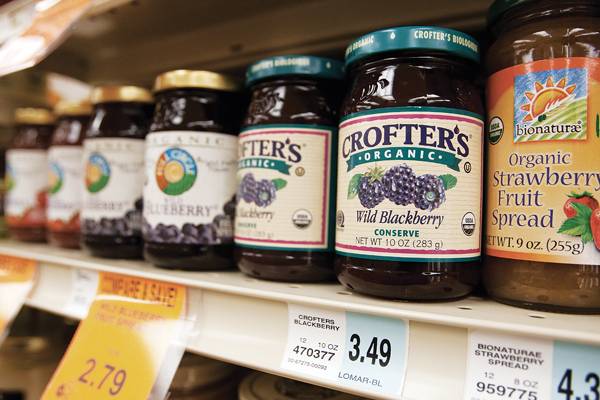Organic certification costs, benefits high

Organic blackberry jam lines shelves in Hy-Vee’s Natural Foods section. The Natural Foods section contains many natural and organic foods, including bulk food and organic coffee and can be found at both Ames locations. Photo: Joseph Bauer/Iowa State Daily
March 21, 2010
While more and more farms are switching to organic farming methods, producers must keep in mind the regulations that need to be followed when growing these crops. In order for produce to be sold as an organic product, it must be certified.
According to the Electronic Code of Federal Regulations, any crop that is labeled as “100 percent organic,” “organic” or “made with organic ingredients” must be certified.
According to the National Organic Program’s Web site, the information a producer must give to an accredited certifying agent includes the type of operation, a list of any substances applied to the land during the last three years, what products are being grown, and a description of the organic system plan. Once a producer has been certified as organic, it must pay an annual fee for certification costs.
“All the certification costs for my operation are around $500 a year,” said Angela Tedesco, owner of Turtle Farm CSA in Granger.
Tedesco said the certification costs, at least in her opinion, out-weigh the hidden costs that are incurred on consumers from conventional farming practices. These hidden costs may include the clean-up of pollution in water due to chemical run-off from fields. According to the National Organic Program’s Web site, only non-synthetic, or natural, substances can be used in organic produce. Synthetic substances, such as conventional pesticides and fertilizers, cannot be used.
Rather than using harsh chemicals, organic producers will incorporate natural methods to help their crops grow.
“On our farm, we spend a lot of time creating biodiversity for pests and small animals,” said Rick Hartmann, owner of Small Potatoes Farm in Minburn. Hartmann said he does this by using crop rotations to help limit the growth of insects that are often seen when a single crop is grown in an area year after year. Marilyn Andersen, coordinator of Farm to Folk Collaborative in Ames, said producers use labor-intensive practices to keep weeds and pests out.
“They manage weeds through hand cultivation, you know, hoeing or cultivating with a small tractor, and they use crop rotations and scouting for pests to help keep the load of damaging insects down,” Andersen said.
The reason for the increase in the popularity of certified organic produce is that consumers believe it is a safer and healthier alternative to conventional produce
“Some people just don’t want pesticides on their foods,” Hartmann said.
Many consumers feel better about eating food that is locally grown and about having the ability to go visit the farm where the food was grown.
“They’ll know that the farmer has taken great care in growing the crop, and they’ll know they won’t be getting pesticide residues,” Andersen said. “They won’t be getting genetically modified crops, because those are not allowed, and they’ll be supporting something that’s good for the earth and supporting sustainable practices.”






